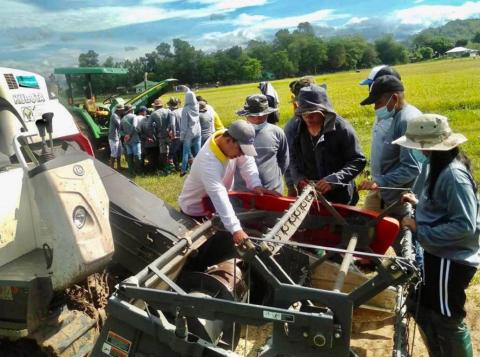Training participants prepare for their hands-on operation of the combine harvester
Central Visayas - Twenty-five participants were trained on a 12-day intensive Training of Trainers (TOT) on Production of High Quality Inbred Rice, Seed Certification, and Farm Mechanization. The training was held on 15 – 26 March 2021 in Bayawan City, Negros Oriental. The training was a combination of face to face and online lectures. All the participants were gathered in Bayawan City were hands-on exercises on rice production and operation of farm machineries were conducted.
The aim of the training is to enable the learners to implement the Modified Season-long Farmer Field School (FFS) on the Production of High-Quality Inbred Rice, Seeds Certification and Farm Mechanization. It is expected that trainers will be able to facilitate and conduct the FFS in their respective local government units and to the Farm Schools of TESDA. Further, this training wanted to expand the reach of farmers who will become competitive through the Rice Competitiveness and Enhancement Fund (RCEF) program.
What transpired during the 12-day training?
Key aspect of the training was about the concepts and principles of the PalayCheck System with mechanized farming practices specifically on the production of high-quality inbred rice seeds. PalayCheck is a dynamic rice crop management system that presents the best key technology and management practices as KeyCheck; compares farmer practices with the best practices; and learn through farmers’ discussion group to sustain improvement in productivity, profitability, and environment safety. Farm mechanization will address the need to lower the production cost of growing palay. Participants were also taught about basic financial management.
“Understanding the PalayCheck System is very useful for our proper farm management. Knowledge on how to operate rice machineries and proper leadership are the foundations of a trainer once we support the FFS activity in the future,” said Noribel Egonia, one of the participants.
Interestingly, majority (60%) of the participants’ age group is between 20 – 30. With a much younger generation of trainers, institutional knowledge about the program will go a long way.
The training was made possible through the collaboration and support from City Agriculture’s Office of Bayawan, Negros Oriental and TESDA in Negros Oriental. The training was facilitated by Jonathan O. Sumagang, Project Officer and assisted by Angelie B. Mencede and Maryjane Flor Patulilic as members of the training management team. Experts from Agricultural Training Institute Regional Training Center (ATI-RTC) Region 7, Bureau of Plant Industry - National Seed Quality Control Services (BPI-NSQCS) Region 7, Department of Agriculture – Regional Field Office (DA-RFO) Region 7, Landbank, PhilMech, PhilRice, local government units, TOT and Rice Specialist Training Course (RSTC) graduates were tapped as resource persons during the training.

